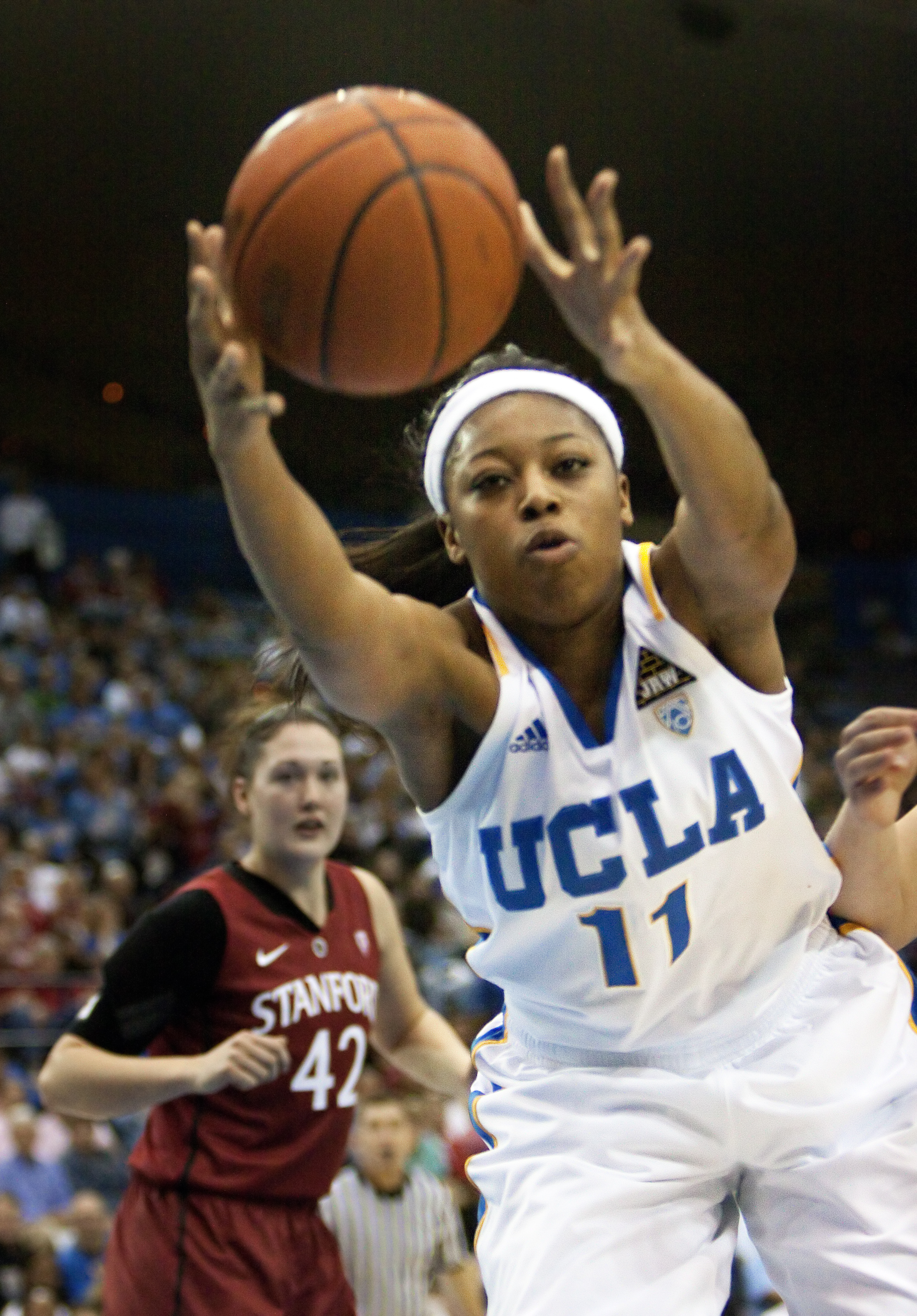The full-court press is now known as a Nikki Caldwell trademark.
At the center of the press patrols an athletic forward, flying from sideline to sideline in the backcourt, arms outstretched, legs punishing the glossed wooden panels below her.
She corners a helpless guard in the depths of Bruin territory and patiently waits for the errant heave. A sudden premonition precedes a quick, astute judgment, and she leaps in the air to snag the ball.
Off the steal, she dishes the ball to a backcourt teammate, who flies in for the layin.
Then it begins again.
It seems so routine now, but just two summers ago, everything almost seemed to be taken away from redshirt sophomore Atonye Nyingifa.
A highly regarded player after her freshman season at UCLA, Nyingifa was flown to Colorado for the USA National Team trials.
There, she competed against the best in the nation, and the aggressiveness heightened as the day progressed.
But during a routine five-on-five drill, Nyingifa was undercut by a defender on a layup attempt.
“I didn’t land right,” she said.
The trainers pulled her out of the game. Her natural competitiveness, one that she believes is the most acute in her family, urged Nyingifa to put herself back into the game. The trainer felt otherwise, ordering her to do some one-legged squats.
And under her own strength, she was able to do them, which cleared her ““ for the moment.
Nyingifa checked back in and promptly attempted to make a sharp cut to get the ball at the top of the key.
When she pushed off with her injured leg, the knee gave out and she promptly collapsed. There was no support.
You’re done, the trainers said.
Nyingifa shrugged the injury off at first, but she couldn’t after going in for a mandatory checkup. It was an ACL tear, the doctor explained, and it would sideline her for a long time ““ perhaps the majority of the season. The news broke her down.
“There’s nothing like tearing your ACL,” Nyingifa said.
Thoughts began swirling in her head, and stories upon stories of previous ACL injury victims began piling up.
“That was my season,” Nyingifa said. “I just instantly started thinking what my team was going to say, what my coach was going to say. … I started to think about everything that could go wrong, and it overwhelmed me.”
One person especially impactful during the rehabilitation process was none other than UCLA coach Nikki Caldwell. Both player and coach would have weekly chats about the tear and the ensuing rehabbing progress.
“When you talk to her, it’s almost like talking to your mom,” Nyingifa said. “There’s almost a calming effect.”
Coaches even participated in the rehab with her, while support from all around gave her the mental edge to persevere and return to the court.
Slowly, Nyingifa regained her quickness, her leaping ability and the rest of the components that made her one of the most highly regarded high school players in the nation.
Then she stepped back onto the court.
“I would just get in and scrimmage,” Nyingifa said. “I will play whoever, teammates, outside teammates … (even) guys.”
Growing up, Nyingifa was no stranger to the different levels of competition.
She honed her game at local parks with her mother and older sister three times a week. As a taller player, she was used to playing inside, but from playing with her older sister, a guard, Nyingifa developed her perimeter skills.
From there, she dominated at Redondo Union High School, winning California Interscholastic Federation championships in 2005 and 2008, and nabbing multiple All-American honors along the way.
The double-double performances at Redondo haven’t quite been replicated at the collegiate level, but what Caldwell has noticed above all else is her toughness, which she feels Nyingifa developed during her redshirt year.
“She learned a lot sitting out that year,” Caldwell said. “She has a different hunger for the game. She doesn’t take for granted that she is able to compete every day and play this game.”
Her competitiveness belies the amicable smile she wears, even when coaches would yell in the background.
“People just say that a lot,” Nyingifa said of her reputable optimism. “I don’t know where I got that from. I guess that’s something from my childhood. I’m just always trying to take a negative and turn it into a positive.”
It’s this mindset that helped her recover from the injury, and one that also helped her get to UCLA at the outset. She attributes her toughness and ability to overcome obstacles to her mother.
Upon enrolling at UCLA, Nyingifa knew exactly what number to wear.
Her older sister wore the number 22, but has since discontinued playing.
“I thought of my sister’s number, 22, and just thought that I was half of her,” she said. “I thought I would just play for my sister because she wasn’t able to further her career in basketball. That’s why I wear my jersey.”
These are the selfless things that have made her an ideal teammate.
“She’s someone you want to be around,” Caldwell said.
And if all those things were packaged together, it would reveal a multidimensional, thoughtful and cerebral person.
But translate that onto the basketball court, and a long, rangy athlete glides around the court, looking for a reason to steal.
Try searching for another Atonye Nyingifa: One would be hard-pressed to find her.
